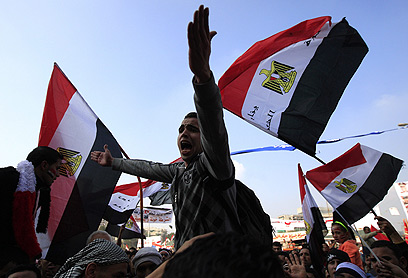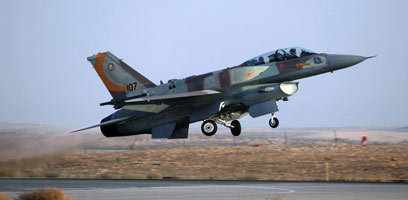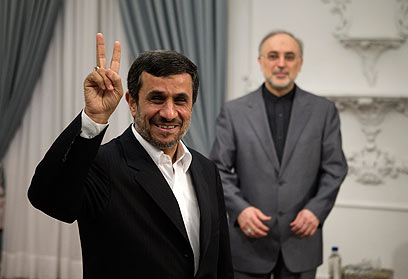There is no doubt that the wave of uprisings that swept through the Arab world in 2011 changed the rules of the game in the region and created potential old-new threats for Israel. With most of them we already successfully contended in the past – for example, the Egyptian army's deployment in the Sinai or terror on our borders with Jordan and Syria. Yet alongside the substantive and potential threats piling up at the outset of 2012, mostly in the short term, we can see quite a few positive developments that may improve Israel's strategic position in the medium and long range.
For example, the blow to be sustained by the "Iranian axis of evil" should Assad's regime in Syria be toppled; or the determination and actions of Sunni Gulf states in contending with Iran's strategic threat using all means – political, economic and military. Even the political rise of Islamic movements as result of the regional uprisings is apparently much less menacing and dangerous for Israel than it seemed.
 Egypt uprising (Photo: EPA)
Egypt uprising (Photo: EPA)
The Muslim Brotherhood in Egypt, Tunisia and Jordan represents what experts refer to as "hybrid Islam" that combines national-social identity with Islamic identity. As opposed to all-out Jihad movements such as al-Qaeda and Palestinian Islamic Jihad, the Muslim Brotherhood clearly prefers the people's economic and social welfare over Jihad. Hence, it will likely adopt a pragmatic policy and aim to distinguish itself from and even fight the fundamentalist Salafists.
The Muslim Brotherhood won't be in love with Israel and harass us at every opportunity, but it will be careful not to annul the peace treaties with Egypt and Jordan and avoid an all-out war that would harm the Arab people. This will likely be true for the post-Assad regime in Syria as well. Hence, the recent clichés about the Arab Spring making way for an "Islamic winter" should be reconsidered. There is good reason to assume that the political success of Islamic parties will not last forever.
On the military front, there was no significant erosion in Israel's overall deterrence in 2011, both in respect to closer and to more distant rivals. This is attested to by the relative quiet on the Syrian, Lebanese and Jordanian borders, the calm in the West Bank, Hamas' aversion for a wide-ranging clash, Iranian tensions in the wake of talk of an Israeli strike, and the fact that the Syrian regime does not rush to use its missiles and rockets against Israel despite the temptation to do so.
For the time being, we are not facing a substantive existential threat. Our deterrence is not the only reason for it, yet it is an important factor. Moreover, Israel's abilities and readiness to cope with military threats have improved and continue to improve. These capabilities are already high at this time, especially on the offensive front, where Israel can surprise both its nearby and remote foes.
 Israeli deterrence intact (Photo: EPA)
Israeli deterrence intact (Photo: EPA)
On the defensive front, Israel's capabilities are still at an initial juncture – the multilayered anti-rocket system is still in early phases and the armored corps only possesses a few anti-rocket systems. However, the bottom line is that should Israel invest the required resources, it has a good chance to successfully cope with the threats against it within a few years and boost its deterrent power.
And what about the Iranian bomb? Here too we can see some positive developments. Despise scientific progress, Iran has not yet decided to produce nuclear weapons. The main reasons for this are the concerns about political survival in the face of paralyzing sanctions and the fear of a military strike. Hence, the West still has a year to a year-and-a-half to adopt harsh means, including a strike. The next decision point will likely come about in March of 2012.
In this context, experts and intelligence officials note that the sanctions already imposed on Iran affect the regime and force it to adopt austerity measures. Hence, in the next year or two it would be deterred from taking drastic steps and especially the decision to produce a bomb.
 Iran fears strike (Photo: Reuters)
Iran fears strike (Photo: Reuters)
In addition, the shocks in the Arab world produced several other phenomena that have a positive potential for Israel. The civil war is weakening the Syrian army and should the regime fall, Hezbollah would lose a military ally and its logistic home front. In other words, Hezbollah will become easier prey not only for Israel but also a weaker foe for other ethnicities in Lebanon. For that reason, Nasrallah is very careful not to take adventurous initiatives at this time.
Meanwhile, Hamas' government in Gaza is concerned that upheaval in the Arab world would also reach the Strip and undermine the group's rule. Hamas also faces economic distress as result of Iranian cutbacks. Hence, the group seeks reconciliation with the Palestinian Authority as well as calm with Israel, in order to secure global legitimacy and money. This creates an opportunity for indirect dialogue – no peace will come out of it, but a long period of quiet is a realistic possibility.
Elsewhere, Egypt's Supreme Military Council is showing a clear intention to continue serving as the leading and dominant political element. Indeed, it has a significant interest in maintaining the close and rewarding ties with the US. Hence, should the Council manage to enforce its will on other political elements, including the Muslim Brotherhood, there is a good chance that the peace treaty with Israel will survive
Meanwhile, there are two initiatives that our government can take and may change Israel's security-strategic situation for the better in an immediate, dramatic fashion. The first move is an initiative that would prompt the renewal of direct negotiations with the Palestinians. The second move is a decision to strike in Iran (on condition that there is a high likelihood that such strike would secure its objectives.)
The two affairs are linked: The renewal of the diplomatic process, despite Mahmoud Abbas' evasive maneuvers, may help Israel extract itself from international isolation and cope with the global response to an Iran strike. Hence, it would be worthy for an initiative on the Palestinian front to promote an initiative to strike. Netanyahu and Barak, as well as other top ministers, know this well. The question is whether they will have the personal courage and political ability to operate on both tracks, as required by Israel's strategic interests.




No comments:
Post a Comment